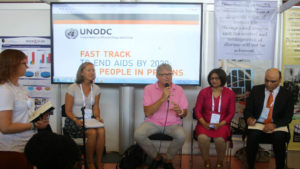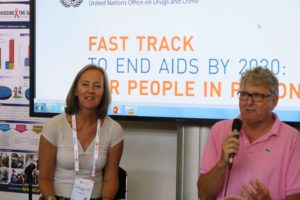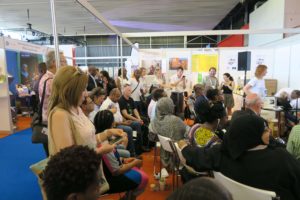 More than 5 000 people, including famous actress Charlize Theron, visited the prison corner in Harm Reduction Networking Zone (HRNZ) located in the Global Village at the 22nd International AIDS Conference (AIDS 2018) in Amsterdam. During five days, visitors could stop by, have a delicious cup of coffee made by former prisoners and participate in a programme with interactive debates, interviews, and presentations. Prisoners are usually a forgotten group since very few organisations pay attention to this vulnerable group of people. Taking into consideration that in many countries the issue of HIV/AIDS in prison is very sensitive and that the implementation of programs in prisons can hibernate or even fail, a pragmatic step-by-step guide for prison authorities and civil sector actors is now being developed by European Monitoring Centre for Drugs and Drug Addiction and European Centre for Disease Prevention and Control.
More than 5 000 people, including famous actress Charlize Theron, visited the prison corner in Harm Reduction Networking Zone (HRNZ) located in the Global Village at the 22nd International AIDS Conference (AIDS 2018) in Amsterdam. During five days, visitors could stop by, have a delicious cup of coffee made by former prisoners and participate in a programme with interactive debates, interviews, and presentations. Prisoners are usually a forgotten group since very few organisations pay attention to this vulnerable group of people. Taking into consideration that in many countries the issue of HIV/AIDS in prison is very sensitive and that the implementation of programs in prisons can hibernate or even fail, a pragmatic step-by-step guide for prison authorities and civil sector actors is now being developed by European Monitoring Centre for Drugs and Drug Addiction and European Centre for Disease Prevention and Control.
The executive director of AFEW International Anke van Dam stressed on the necessity of working in prisons in Eastern Europe and Central Asia (EECA). Health protection in prisons is a serious public health issue. Even though international law recognises the right of everyone, including people deprived of their liberty, in practice, many prisoners receive healthcare of a lower standard to the one available outside of the prison, if they receive treatment at all. In Eastern Europe and Central Asia, the unbearable circumstances and lack of coherency within the penal systems of the regions exists. AFEW recognizes the importance of people living within prisons receiving the same healthcare and life opportunities during and after their stay in prison. Together with prison authorities, AFEW is in constantly implementing prison health projects that seek collaboration with organisations working in prison. To introduce the region where AFEW is actively represented, Anke van Dam gave a book Invisible Lives: HIV on the Fringes of Society to Monica Beg, Chief of HIV/AIDS Section and Global Coordinator for HIV/AIDS at United Nations. Stories from the representatives of key populations from Tajikistan and Ukraine are depicted in the book.
AFEW expresses a big gratitude to our prison corner partners: The Council of Europe Pompidou Group, Asian Harm Reduction Network, International Corrections & Prison Association, Health Through Walls and UNODC.
Ukrainian success with the monitoring instrument
During the session about engaging young people who use drugs in Ukraine in the HIV and human rights response, AFEW-Ukraine presented the developments achieved during ‘Bridging the Gaps: Health and Rights for Key Populations’ and PITCH projects, supported by the Ministry of Foreign Affairs of the Netherlands.
 AFEW-Ukraine’s manager Irina Nerubayeva presented the instrument for monitoring violations of human rights of adolescents using drugs in Ukraine, that has been used for a year among the partners in four regions of Ukraine. ‘Bridging the Gaps’ project partner – social worker from Kharkiv NGO Blago Alina Khokhlova – told about challenges and results of using the instrument and emphasized the importance of her organisation in developing effective advocacy programs in the city. Youth activist Daria Kopyevskayskaya from Kropyvnitsky (NGO Return to Life) emphasized the role that young people play in delivering information to their peers about rights.
AFEW-Ukraine’s manager Irina Nerubayeva presented the instrument for monitoring violations of human rights of adolescents using drugs in Ukraine, that has been used for a year among the partners in four regions of Ukraine. ‘Bridging the Gaps’ project partner – social worker from Kharkiv NGO Blago Alina Khokhlova – told about challenges and results of using the instrument and emphasized the importance of her organisation in developing effective advocacy programs in the city. Youth activist Daria Kopyevskayskaya from Kropyvnitsky (NGO Return to Life) emphasized the role that young people play in delivering information to their peers about rights.
Legal expert Vita Musatenko presented the most typical cases that were identified in the process of monitoring and advised what social workers can do to provide adequate response and help to a young person. Evgenia Kuvshinova from NGO Convictus told about her work with young people who use drugs in Kyiv at the Street Power Club where young clients receive a range of services, including testing for HIV, sexually transmitted diseases, hepatitis. There they also engage in educational activities and are trained as leaders.
From harm reduction programmes to methadone therapy
The session on HIV prevention, treatment, and care in the countries of the former Soviet Union allowed to learn about challenges and achievements of prison programmes from various countries of the former Soviet Union and receive information from government officials and NGOs. The head of the Medical Department of Kyrgyz Penitentiary Service Nazgul Soltobekova told about the system of HIV prevention and treatment in Kyrgyz prisons. She also shared the country’s successful experience in providing comprehensive services for people who use drugs in penitentiary facilities – from harm reduction programmes to methadone substitution therapy.
 Konstantine Turashvili from the medical department of the Ministry of Corrections of Georgia told about HIV programmes in Georgian prisons and the country’s successes in hepatitis elimination programmes. Both speakers emphasized the importance of cooperation with community-based organisations that provide effective counseling services for inmates and help to ensure continuity of care of those released from detention facilities. This topic was further followed by Natalia Rudokvas from Kazakh NGO “Answer” who shared the experience of her NGO’s work with HIV positive inmates. Ikrom Ibragimov from AFEW-Tajikistan shared his experience of cooperation with the penitentiary system and told how NGO can build the capacity of prison staff in HIV, TB, and other related issues.
Konstantine Turashvili from the medical department of the Ministry of Corrections of Georgia told about HIV programmes in Georgian prisons and the country’s successes in hepatitis elimination programmes. Both speakers emphasized the importance of cooperation with community-based organisations that provide effective counseling services for inmates and help to ensure continuity of care of those released from detention facilities. This topic was further followed by Natalia Rudokvas from Kazakh NGO “Answer” who shared the experience of her NGO’s work with HIV positive inmates. Ikrom Ibragimov from AFEW-Tajikistan shared his experience of cooperation with the penitentiary system and told how NGO can build the capacity of prison staff in HIV, TB, and other related issues.
Being an expert in prison health, AFEW will continue advocating for HIV, TB and hepatitis C prevention and treatment programs for prisoners in EECA. We are promoting essential elements like harm reduction, including needle and syringe programmes, and opioid substitution therapy. Transitional client management that prepares prisoners for release and ensures linkage to follow-up after release is a valuable variant of client management that meets many of (ex)prisoners’ needs.



